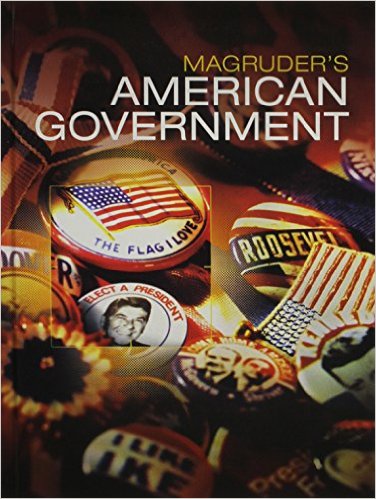
Magruder’s American Government
1st Edition
ISBN: 9780133306996
Textbook solutions
All Solutions
Section 5-3: The President’s Domestic Powers
Exercise 1
Step 1
1 of 4
The **imperial presidency** can be referred to as a potentially dangerous activity that is **not according to the Constitution**. Under the Constitution, the term imperial is used because the president sometimes uses greater power than he is supposed to, meaning that the president does not seek Congress’s approval in military actions. The situation of the imperial presidency usually arises around emergencies that require military correspondence.
Step 2
2 of 4
**Theodore Roosevelt** deployed American troops to foreign territories and established new governments on several occasions without Congress’s approval. Therefore, it can be said that President Roosevelt is **directly related to the term imperial presidency**.
Step 3
3 of 4
This is **not an unfamiliar situation** that presidents start and proceed with military actions without the permission of Congress. This is an ongoing issue because it does not align with a system of checks and balances, and without the system, the nation might gain dictatorial characteristics. The likeliness of president Bush, Trump, and others are linked, based on their political actions, to the idea of the imperial presidency.
Result
4 of 4
**Theodore Roosevelt is directly related to the idea of the imperial presidency**. See the steps for the explanation.
Exercise 2
Step 1
1 of 3
The increase in the president’s number and scope of orders **suggests that the number of political issues the president and executive branch face has increased** due to more requirements of resolutions.
Step 2
2 of 3
This is the case probably because the U.S. is growing as a force in the world, and that almost always comes with more problems and situations to tackle. Plus, seemingly because of the increase in international issues of all kinds (for example, military and economic issues) globally.
Result
3 of 3
It suggests that the **presidency demands more responsibilities** as there are more issues that the president needs to resolve.
Exercise 3
Step 1
1 of 2
Presidential appointments are a necessity to the federal government of the United States. President has the executive power to make appointments, but the characteristic of checks and balances in it is that the appointment made by the president has to be approved by Congress.
Result
2 of 2
The **presidential appointments** are an example of checks and balances because **they have to be approved by Congress**.
Exercise 4
Step 1
1 of 4
President **George Washington used the power of veto only two times** during his presidency. To note, **veto power is an “exceedingly valuable tool”** because it gives the president the authority to defeat a bill and put it to further readjustment. If so, it has to be approved by enough votes from the Congressional leaders, which is not an easy task.
Step 2
2 of 4
The political issues faced by the president nowadays are not in the ratio nor latitude as, during the presidency of G. Washington, they are in a much larger margin. Therefore, there is a higher chance only based on that of a president using the veto.
Step 3
3 of 4
Another reason could be that the **government had a different structure and relationship between the officials**. Compared to the political ones today, the relationship was more content and active in the nature of exchanging political matters between board members and leaders in Congress, including G. Washington. It can be said that everyone had a significant amount of respect for President Washington. This is relevant because the bills passed were most probably already in line with Washington’s standpoints; therefore, there was no need for him to veto the bills.
Result
4 of 4
G. Washington barely used his veto power, most likely because **the bills passed by Congress were already aligned with Washington’s standpoints** due to Congress’s reverence towards G. Washington. See the steps for further explanation.
Exercise 5
Step 1
1 of 4
To keep the system of government under the right control, checks and balances are applied to each of the branches.
Step 2
2 of 4
The **judicial branch is often charged with the power to check the proper extent of the presidential powers**. This is because the judicial branch is obligated and has a role of a protector by reviewing whether matters in different branches are following the laws aforesaid in the Constitution; this includes the presidential powers as well. The judicial branch lets the president know when and if he breaks the rules of the Constitution.
Step 3
3 of 4
The legislative branch can also check on the president’s specific political actions, such as the presidential veto of his decisions that a two-thirds Congress vote can disregard.
Result
4 of 4
The **judicial branch** of the government is often charged with evaluating the extent of the presidential power. See the steps for more explanation.
unlock

